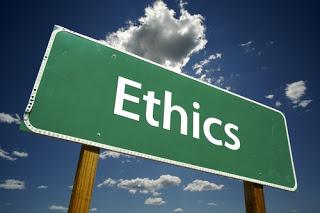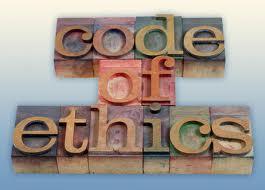
Ethics in Profession
The word ‘ethics’ is derived from the ancient Greek word ethikos which means custom and habits. Ethics is the study of values and customs of a person or group and covers the analysis and employment of concepts such as right or wrong, good or bad, do’s or don’ts. Ethics, in broad sense, deals with human conduct in relation to what is morally good or bad, right or wrong and application of values to decision making. The ethical values include integrity, honesty, fairness, responsibility, respect and compassion.Ethics and morals are the boundaries not only defied individuals’ thoughts and character but also define boundaries for business and profession. Wherever there are investors and creditors involved, ethical codes in accounting and auditing can never be ignored. Ethics can be defied as a set of distinct guidelines for a business or profession which are to be maintained for proper conduct. Hence code of ethics in every organization has become stringent and for professional accountant, in particular, are the set of strict conduct or principles as issued by the national and internationals organizations to regulate the profession within the defined discipline and principles. Introduction:Profession is guided by the ethics. This allows the professional to practice or perform their duties and responsibilities with due care and knowledge and helps to maintain the public’s trust on overall profession. A profession is an occupation that requires specialized knowledge, extensive training, ethical code and process of certification or licensing to public. Generally, professional accountants categorized in two types namely practitioner and employee. Public practitioner engaged in firms or independently operates firms that provide accounting, auditing, consultancy and advisory services to the clients. Employee of industries serves as chief executive officer, chief operating officer, financial controller, internal auditor, management accountant, financial manager or financial analyst. Regardless of the diversified role, professional accountants should adhere to code of ethics which are applied to their professional conduct. Ethics in accountancy profession are of utmost importance. Business world, as of now, is following international reporting and auditing standards. It is becoming need of the hour to adhere to code of ethics prescribed by international and national accounting organization.

Code of Ethics
Accountants, today not only work in public practice but many of them are working within industry and government organizations. Accountancy is the measurement, estimation, disclosure of financial information that helps stakeholders, managers, investors, tax authorities, lenders and decision makers to make resource allocation, policy making as well as investment decisions. Accounts, of course, are independent business advisors and offer an extensive range of services. They help to set up client’s accounting systems, tax advisor, fraud or embezzlement detector, on budgeting and financial statement analysis, advisor on financial plan and policies, provide specialist knowledge and help to conduct the business within an ethical environment.Concern for Ethical Issues: It is saying that “if your foot slips, you can recover your balance, if your tongue slips, you cannot recover your words.” Similarly, it may worthy to mention here that “this spoken word is like a stone, once it is thrown, it cannot be retrieved.” These are the common proverbs that explain what we are bound to follow.Code of ethics is not a legal rule to be binding but is a rule to follow. Codes of conduct cannot detail a solution for every ethical situation, so professional must aware about ethics and they must demonstrate ethical behavior and arrests makes the headline news in newspapers and flash news in the television screen. Similarly, officers charged with deterring, wrongdoing and not ensuring ethical conduct have been closely monitoring for their actions. Social responsibility, balance between what’s right and what’s wrong, choices in difficult situations and often requirements by the ethical environment and the standards of conduct and moral values governing actions and decisions in the work environment of the professionals.Code of Ethics:Codes of ethics are the rules of professional organization’s values on ethical and social issue relating to the profession. However society places even higher expectations from professionals. Public need to have confidence in the quality of the services provided by professionals. Ethics are invaluable to accounting professionals and to those who rely on their services. Professional accountants therefore, must not only be qualified but also possess a high degree of professional integrity and objectivity. Because of these high expectations, professionals have adopted codes of the ethics. Ethical codes should follow by the members to maintain a level of self-discipline that goes beyond the requirements of laws and regulations. The responsibility of professional accountant’s is, therefore not exclusively to satisfy the needs of an individual client or employer but to act in the public interest.IESBA of IFAC has developed and issued ethical standards and other pronouncements for professional accounts for use around the world. The code of ethics establishes ethical requirement for professional accountants. A member body may not apply less stringent standards than those stated in the IFAC code of ethics. However, public can only trust towards professional; when it is made mandatory to observe and follow strict regulations; and code in terms of their public practice and employment.Ethical Responsibilities:Ethical responsibilities include the information generated by professional accountant is accepted by clients, employers, governments, investors, creditors, and the business community. Code of ethics is an integration of the qualities of confidentiality, integrity, competence and objectivity. Hence, accounting professionals undertake the tasks, adhering to code of ethics as defined by the professional body operates in that jurisdiction.Compliance of ethics is the prime responsibility of the professional account. Unfortunately, this position, like so many others is being abused and neglected when it comes to morals and ethics. As an accountant we have commitment to the client to demonstrate competency, confidentiality, integrity, and credibility. Competency is where we must show a level of professionalism as well as developing the knowledge and skills that we will need as an accountant. Confidentiality is when we as an accountant must keep information confidential unless authorized or legally required to release client information. Integrity is when we must communicate with the associates to avoid any conflict of interests. Credibility is wen we must communicate information in a reasonable and objective manner.Enforcement:Ethics enforcement is a primary concern of any organization and it is as important as making code of ethics. Violations of ethics can lead to expelling from the profession. Many a time, violating ethics by professional accountant lead to more stringent disciplinary measures by the provisional body. The professional accounts specially have to be more serious when it comes a auditing financial statement of public corporation as any case of fraudulent conditions can result in revoking their practicing right. Codes of ethics are the backbone of any professional. If the members have not followed these guiding principles, their actions are called into question under disciplinary case, will be asked to justify the steps taken by them. When an allegation of professional negligence is making against member, the institute is likely to take account of the contents of any relevant guidance note published in deciding whether the member acted with reasonable care and competence. If the member follows the recommended practices, then he should have at least a partial defense to an allegation of negligence. On the other hand, if he does not follow the code of practices will be judged negligent. In the event of litigation, the court may need to explain to him, why you decided not to adopt the recommended practice. Ethics help in understanding the importance of business or professional conduct. Some effective measure such as oversight with peer review can be adopted to prevent any more accounting ethical issues and economical fiasco. The Oversight Concept:The need of the oversight concept realized high-profile business failures like Enron (2001), called into question the effectiveness of the profession’s self-regulatory process as well as the effectiveness of the audit to uphold the public trust in the capital markets. Accounting rules prior to the scandals of 2001 left number of loopholes that were exploited and created a mindset where form was more important than substance. The oversight concept came in to picture when Sarbanes-Oxley Act of 2002 has designed the rules of corporate governance and related business practices including set up the public company accounting oversight board (PCAOM) with authority to enforce auditing, certification, attestation, quality control and ethics standards for public companies. In addition, the law expands the independence of audit committees. The Sox Act 2002 added oversight concept to regulate public accounting firms that audit the financial records of these corporations. The Act was a legislative reaction to corporate accounting scandals that appended in 2001. These scandals resulted in a great loss of public trust in corporate accounting and practices. Sarbanes-Oxley was enacted as a major effort to prevent accounting scandals and other problems from recurring and to rebuild public trust in corporate business practices and reporting. After the failure of Enron and other big business houses, the quality of work done by the professional accountant have put many questions to their services to the clients and accounting professional bodies in their jurisdictions started to set up oversight agency either in the name of peer review board or quality control board for auditing the services provided by the auditors to their clients.Ethics: Lesson learned It is very important for an accountant, to understand the rule s and regulations of his positions in public practice and in an organization. Any deviation from the moral code of conduct or abusing the ethics can result in dire consequences, such suspension of license etc. a major example citing the importance of professional ethics concerning accounting happened in the infamous case of US based Enron. When the real picture of Enron was racing towards bankruptcy, it was camouflaged by schemes covering up for heavy losses through creating fictitious entities, indicating profitability. This kind of scheming was as good as defrauding investors. All this was an outcome of mishandled accounting and a severe audit failure. Hence code of ethics in every organization has become stringent. For auditors, there are set of strict conduct as defined by the professional body.Now we know how important ethics of accounting is. Because the investors rely on every bit of information and financial report generated by management and audited by the independent auditors. The cascading effects of abusing or violating the professional ethics in accounting are severe. When the investor’s confidence and trust are broken, the capital market gradually begins to collapse or crash. And in no time, the economy of the country is in severe financial crisis. Accountability is the prima facie factor in both business sector and profession. Precisely, a profession whether it may be accountancy or any other else is no more reputed profession in the society, without the compliance of proper code of ethics. Conclusion:Accounts are known and respected in the society because of their honesty, integrity and competence. Ethical and professional responsibility is something that should be shown and taken seriously. Accountants should ready to hold up the dignity of profession and ready to be responsible in the performance of the public interests. Whether it was US based Enron or India based Satyam, compliance of ethical compliance of ethical codes are the good examples for professional accountants to be learnt. These financial scandals involved their accounting firms and what happened was that there was an involvement of irregular accounting procedures. Ultimately, this caused Enron to go bankrupt and Satyam to be reengineered. The unethical issue in Enron case involves an accountant and what they did was fabricated document that were involved in the audit and the professional accountant was convicted. This is a good example of why it is important for all accountants to follow and practice good ethical values and conduct. It is because the other professional accountants do not want to end them like the accountant in the Enron.Reference: This article by CA. Paramananda Adhikari (he is the technical Director at ICAN), this article also published in the journal of ICAN